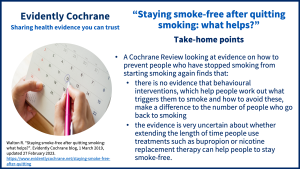In this blog for people who have just stopped smoking Robert Walton, a general practitioner, helps you work out how best to stay smoke-free, looking at the latest Cochrane evidenceCochrane Reviews are systematic reviews. In systematic reviews we search for and summarize studies that answer a specific research question (e.g. is paracetamol effective and safe for treating back pain?). The studies are identified, assessed, and summarized by using a systematic and predefined approach. They inform recommendations for healthcare and research. on relapse prevention.
Page updated 27 February 2023.
Take-home points
So you’ve managed to stop smoking – very well done indeed! Stopping smoking brings a huge benefit in health not just for yourself but also for the rest of your family.
About half of the people who continue to smoke will die because of their habit, but if you stop by the age of 50 you halve that riskA way of expressing the chance of an event taking place, expressed as the number of events divided by the total number of observations or people. It can be stated as ‘the chance of falling were one in four’ (1/4 = 25%). This measure is good no matter the incidence of events i.e. common or infrequent.. And as you might expect, people who stop by the age of 30 are even better off – they avoid almost all the increased risk to their health arising from smoking in their younger years.
For children of smokers the risk of respiratory illness and ear infections is increased and second-hand smoke is a major cause of premature death in people who don’t smoke themselves but who share a house with a smoker.
But as the old joke goes ‘Stopping smoking is easy – I’ve done it a hundred times!’. A Cochrane ReviewCochrane Reviews are systematic reviews. In systematic reviews we search for and summarize studies that answer a specific research question (e.g. is paracetamol effective and safe for treating back pain?). The studies are identified, assessed, and summarized by using a systematic and predefined approach. They inform recommendations for healthcare and research. Relapse prevention interventions for smoking cessation (October 2019) of 81 research studies with just over 69,000 people taking part showed that for every hundred people who stopped smoking about seventy went back to cigarettes over the next 15 months. So almost all the benefits in health that the people might have gained were lost.
Smoking rates are falling dramatically in the United Kingdom and have dropped by almost a quarter over the last five years. But the latest figures from 2017 show there are 7.4 million people still smoking and it is therefore vitally important to find better ways of helping these people to stop smoking for good.
What does the Cochrane evidence tell us?
This Cochrane Review found several different ways of preventing relapse had been tried in a range of different studies and most looked at the effects of ‘behavioural interventions’. For this kind of treatmentSomething done with the aim of improving health or relieving suffering. For example, medicines, surgery, psychological and physical therapies, diet and exercise changes. people are taught different ways of identifying the triggers that make them smoke and are helped to work out ways of avoiding them. Rather disappointingly there was no evidence that these interventions made any difference to the numbers of people who were going back to cigarettes. Although the effects of the interventions varied considerably from studyAn investigation of a healthcare problem. There are different types of studies used to answer research questions, for example randomised controlled trials or observational studies. to study so it is possible that some behavioural methods are better than others, but no firm conclusions could be drawn.
The remainder of the studies looked at people who had stopped smoking using a particular drug therapy to see whether extending the treatment could help to prevent the drift back to tobacco.
The evidence was very limited about whether extending the duration of treatment with certain drugs available in the United Kingdom (such as bupropion and nicotine replacement therapy) can help people stay smoke-free.
There was some evidence that extending treatment with varenicline beyond the usual three months probably helps to stop people from going back to tobacco. However, varenicline is not currently available in the UK or Europe. It has been withdrawn as a precaution, because of an impurity found in the medicine and it may be unavailable long-term.
Where does this leave you?
Well, it’s important to remember that each time you stop smoking you give yourself another chance of staying smoke-free. If you haven’t already why not try the NHS Stop Smoking service?
Join in the conversation on Twitter with @rtwalton123 @CochraneUK or leave a comment on the blog.
Declaration of interest:
Dr. Walton reports grants from NIHR Health Technology Asessment, grants from NIHR Programme Grants for Applied Research, other from TTS Pharma, outside the submitted work; In addition, Dr. Walton has a patent WALTON R, MCKINNEY E, MARSHALL S, MURPHY M, WELSH K, others. GENETIC INDICATORS OF TOBACCO CONSUMPTION. Patent number: 2001038567. Filed date: 24 Nov 2000. Publication date: 01 Jun 2001 with royalties paid to gNostics.



